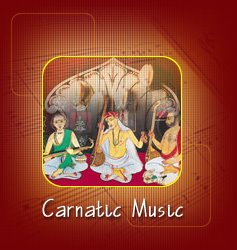
Musical Background:
Mangalampalli Balamurali Krishna (M. Balamuralikrishna, Mangalampalli Balamuralikrishna, M. Balamurali Krishna) (b. Sankaraguptam, Andhra Pradesh, India, July 6, 1930) is a legendary Carnatic Music (south Indian classical) composer, poet, vocalist, multi-instrumentalist, innovator and musical iconoclast. His magnificiently rich and instantly recognizable voice extends, with perfect control, over three octaves.Balamuralikrishna has consistently displayed a mastery of classical musical traditions of India and has composed more than four hundred pieces. In addition to performing more than 18,000 concerts throughout the world, Balamuralikrishna has released more than 250 cassettes in his native country. The "Bala" in his name means "child", and was added when he first gained fame as a child prodigy performing vocal concerts at the age of five. His father Pattabiramayya was a well known musician and could play the flute, violin and veena and his mother Suryakantamma was an excellent veena player. Balamuralikrishna thus began his musical career at a very young age. He soon mastered a variety of instruments, melodic and rhythmic, and is the only musician ever to be honoured with All India Radio's "Top Grade" for seven different performance areas. He is an enterprising instrumentalist who plays violin, viola, khanjira, veena, mridangam and other instruments. He is also the only musician ever to win National Awards in India for classical music, music direction and film playback singing.
While his native tongue is Telugu, he sings with crystal-clear lyrical enunciation not just in Telugu but also in Kannada, Sanskrit, Tamil and less often, in a few other languages as well. His mesmerizing vocal music combines a charmingly deep voice, effortless control over the notes, extraordinary musical knowledge, spontaneous on-stage musical originality and a consistently accurate rendition of lyrics. Consequently, it has caught the pulse of and endeared itself to vastly diverse audiences across generations, cultures and continents. He belongs to that rarest breed of Carnatic musicians who remain popular with laypersons without watering down the classicism inherent in the ancient artform. His rendition of some of Saint Thyagaraja's kritis is spiritually uplifting. Given the astounding versatility, longevity and resilience of his artistic life, spanning over seven creative and prolific decades, it can be stated without exaggeration that Dr.M.Balamuralikrishna has, for quite some time, been India's most enduring musician. Balamuralikrishna during a concert in Kuwait on 29th March - 2006. Accompanied By Mavelikkara Sathees Chandran(Violin), Perunna G. Harikumar(Mridangom), Manjoor Unnikrishnan(Ghatam) - This was his 25641'th ConcertNearly 400 Carnatic musical compositions are credited to him. New raga(Ganapathi,mahati, sumukham, trisakthi, sarvashri, omkari, janasamodini, manorama, rohini, vallabhi, lavangi, pratimadhyamavathi, sushama etc...) some with only three or four notes, and a new tala (rhythm) system are among his iconoclastic innovations. Such innovations have provoked many criticisms, but his musical inventiveness remains unblunted. Top Hindustani (north Indian classical) musicians have collaborated with him in "jugalbandhis" (duets akin to jamming): including Pandit Bhimsen Joshi, Pandit Hariprasad Chaurasia and Smt. Kishori Amonkar, among others.
He appeared as featured soloist with an award-winning British choir, performing the "Gitanjali Suite" with words from Rabindranath Tagore's Nobel Prize-winning poetry and music by Dr. Joel, the noted UK-based Goan composer. His clear diction in several languages prompted an invitation to record Tagore's entire Rabindra Sangeet compositions in Bengali, preserving them for posterity. He has sung in French, and even ventured into jazz fusion, collaborating with the top Carnatic percussion teacher, Sri T.H. Subash Chandran, in a concert for Malaysian royalty.
Balamuralikrishna has also proved his talent as a playback singer, music director and actor in several languages. He received National Awards as the best playback singer for 'Hamsageethe' (a Kannada feature film), best music director for 'Madhvacharya', and left an indelible imprint in the hearts of the people with his portrayal as a hero in the Malayalam film in 'Sandhya Kendina Sindooram'
Honours have pursued him. He was awarded the prestigious "Padma Vibhushan" title by the Indian government, the "Chevalier des Arts et des Lettres" by the French government, seven doctorates as of 2006, the pro-chancellorship of Telugu University and numerous top musical honours including Sangeetha Kalanidhi of the Madras Music Academy. He was also conferred with the prestigious Raja-Lakshmi Award in the year 1980 by Sri Raja-Lakshmi Foundation,Chennai. The prestigious award "Sangeetha Saraswathi" instituted by Manava Seva Kendra was conferred on him by its founder-guardian Poojya Sri Guruji Viswanath, on 25th June 2005. The city of Vijayawada in Andhra Pradesh, India, has named a road after him. The record-buying public have supported him enthusiastically, prompting record labels to issue hundreds of his recordings. He has become increasingly interested in music therapy, and now performs only occasionally.
In the late-1960s, he served as music producer for the Vijayawada and Hyderabad All-India radio station and launched an early morning show of devotional readings, "Bhakthi Ranjani". He served, simulataneously, as the principal of the Government Music college in Vijayawada. Transferring to the All-India radio station in Madras, he settled in the city where he continues to reside.
He is believed to have said, "for me, as a creative musician, composition is a daily function that I feel compelled to discharge. I compose because I am made for that and cannot do otherwise. I stumble upon something unexpected. This unexpected element strikes me. I make a note of it. At the proper time, I put it to good use."
When music flows from Balamuralikrishna, you can realise what the crazy gopi-s felt in their ecstasy of Divine Love. To be born with music in his heart, to hold a recital at a tender age of only eight-deepavalis, to be at once a master in many instruments, apart from his unfailing purity of voice, tala and raga; these are indeed preciously rare in one single person unless he is a genius [Swami Chinmayananda].
Popular compositions: Varnams in ragas like Shanmukhapriya and Tillanas in Kuntalavarali etc.



